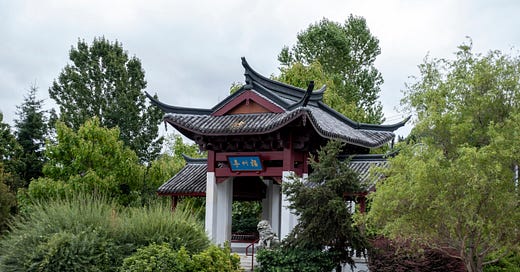Built on Exclusion
Long before 1924, the United States had immigration laws designed to keep people like my family out. Ignoring that isn’t justice—it’s amnesia.
Yesterday, I did something very unusual. I logged in to Facebook.
I’ve had to stop using it because, for my neurology, the constant partisan flicking of boogers across the aisle is not healthy. Still, every now and then, I check in to see what friends are up to. I no longer trust people on Facebook enough to share anything personal, but sometimes I like to watch from the edges.
I’m so reclusive these days that sharing anything about my life outside of formal writing is rare. Almost unheard of.
But as so often happens, the first thing Facebook showed me wasn’t a friend’s update. It was a political post from someone on the left who sees themselves as inclusive and enlightened. The kind of person who wants to say the right thing. And yet, their post completely erased the history of anti-Chinese immigration law in the United States.
They were trying to counter the right-wing talking point of “Well, my family came legally, why can’t others?” The meme claimed that before 1924, the U.S. had open borders. It framed white immigration as easy, requiring little more than a steamer ticket, and painted everything else as a recent deviation.
As someone who has studied history deeply, especially the long record of anti-Asian and anti-Chinese bias, I knew immediately that the U.S. hadn’t had open borders since at least the second half of the 19th century. I knew the names and dates of the laws. I knew who they targeted. I knew who was left out.
So I replied. I pointed out that whatever argument they were trying to build fell apart, because if your premise is factually false, then your conclusion cannot be trusted. This is basic logic. You can’t build justice on a lie.
And what did I get in response?
“So, we’re not allowed to call out false statements from the right?”
It is stunning how entitled so many white liberal Americans feel. As entitled, or maybe even more so, than those on the right. To make a political argument by erasing one of the most painful periods of Chinese-American history left me flabbergasted.
Let’s talk about facts.
The idea that the United States had “open borders” until 1924 erases over half a century of targeted immigration restriction, especially against Chinese immigrants and other people of Asian descent.
Here’s a short list of just some of the laws that predate 1924:
Page Act of 1875
The first restrictive federal immigration law. It specifically targeted Chinese women, especially those accused (without evidence) of being prostitutes. It was a thinly veiled attempt to limit Chinese family formation.
Chinese Exclusion Act of 1882
The first major law to ban immigration based on nationality. It suspended Chinese labor immigration and denied Chinese immigrants the ability to become U.S. citizens.
Scott Act of 1888
Barred reentry to any Chinese person who left the U.S., even if they had legal residency. Over 20,000 people were stranded overseas and denied return.
Geary Act of 1892
Renewed and strengthened the Chinese Exclusion Act. It required Chinese residents to carry internal passports (residency certificates) at all times or face arrest and deportation.
Immigration Act of 1917
Also known as the Asiatic Barred Zone Act. It expanded exclusion to people from much of Asia and the Pacific Islands and increased literacy and health requirements across the board.
Meanwhile, immigration infrastructure was already formalized long before 1924:
Ellis Island opened on January 1, 1892 as a federal immigration station. It processed mostly European immigrants arriving on the East Coast.
Angel Island opened on January 21, 1910 as the West Coast counterpart. Unlike Ellis Island, Angel Island functioned less as a welcome center and more as a detention facility, primarily for Chinese immigrants.
So no, the borders were not “open” until 1924. That is not how immigration worked. What changed in 1924 with the Immigration Act (Johnson-Reed Act) was the introduction of strict national origins quotas that formalized white preference and excluded nearly all Asians outright. It built on existing exclusion. It did not begin it.
That is why I find that meme, and the arguments defending it, so infuriating. It is not just wrong. It rewrites history in a way that lets people feel righteous while continuing to erase my family and community.
I didn’t say any of this on Facebook. Not the full history. Not the details. I’ve learned not to bother. The cost of explaining is too high, and the trust required to speak plainly is gone.
I’ve spent nearly forty years learning this history. Most of it did not come from American classrooms. It came from historians in Taiwan who filled in what U.S. education had carefully left out. The more I learned, the clearer it became just how deep the erasure runs. And watching it happen again, this time in the name of progress, is exhausting.
This is why I stay off Facebook. This is why I write.
If you're going to make political arguments, especially about immigration, learn the history. All of it. Not just the parts that support your team. If your version of justice depends on forgetting people like me—someone born here, with an American passport but whose first memories of the place are in 3rd grade—and forgetting people like my wife, my son, my daughter-in-law, and the millions of others who have been treated as sub-human, erasable, and disposable, then maybe what you're defending is not justice at all.




